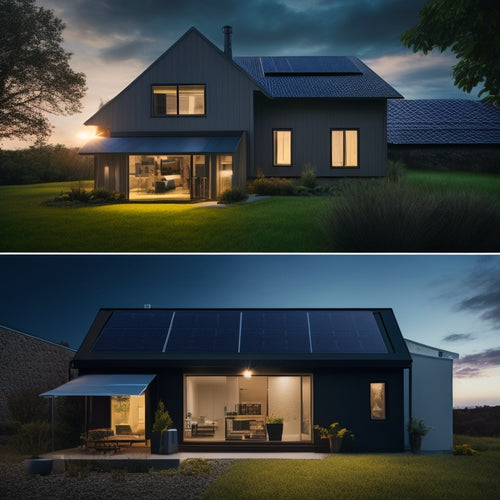
What Makes Solar Water Filters Effective
Share
Solar water filters are effective because they utilize advanced technology and sustainable practices to purify water efficiently. They use innovative filtration techniques, like membrane technology and activated carbon, to remove up to 99% of contaminants and pathogens. By relying on solar energy, these systems keep operating costs low while minimizing environmental impact. Plus, they operate independently of the electrical grid, making them accessible in remote areas. This combination of cost-effectiveness and high performance sets solar water filters apart. To understand more about their unique benefits and applications, you might find further details intriguing.
At a Glance
- Solar water filters utilize renewable energy, minimizing electricity costs and ensuring low operating expenses compared to traditional filtration systems.
- Advanced filtration technologies, such as membrane and activated carbon, effectively remove up to 99% of pathogens and pollutants from water.
- The use of biodegradable and recycled materials enhances eco-friendliness and reduces waste, aligning with sustainable practices.
- Solar water filters promote public health by reducing waterborne diseases and lowering reliance on fossil fuels and chemical treatments.
- Customized filtration solutions are essential for addressing specific contaminants based on the source of water, ensuring optimal purification.
Cost-Effective Water Purification Solution
When you consider solar water filters, you'll notice their low operating expenses stand out as a significant advantage.
By utilizing renewable energy, these systems reduce your long-term costs, providing a sustainable solution for water purification.
Additionally, their ability to effectively remove 99.9% of bacteria and pathogens guarantees that you're not only saving money but also enhancing your health safety through reliable water treatment effective water purification.
Over time, the savings can accumulate, making solar filters an economically smart choice for households and communities alike.
Low Operating Expenses
Utilizing solar energy for water filtration considerably reduces long-term operating expenses, making it a cost-effective solution for communities and individuals alike. By utilizing the sun, you minimize reliance on costly electricity and fuel sources, leading to significant savings. The operational efficiency of solar water filters allows for effective purification with low ongoing costs.
Here's a comparison of traditional water filtration systems versus solar water filters:
| Aspect | Traditional Systems |
|---|---|
| Energy Source | Electricity or Fuel |
| Maintenance Costs | High |
| Reliability | Subject to power outages |
| Environmental Impact | Higher carbon footprint |
In contrast, solar water filters not only provide affordable maintenance but also promote sustainability. They operate independently of the grid, ensuring that you have access to clean water without incurring additional energy costs. By investing in solar technology, you enable yourself and your community with a dependable water purification method that minimizes environmental impact and maximizes resource efficiency. The upfront investment may be recouped quickly through these low operating expenses, allowing more freedom and flexibility in your budget for other essential needs.
Long-Term Savings Benefits
Maximizing your investment in solar water filters can lead to significant long-term savings, making them an attractive choice for water purification. Compared to traditional systems, solar filters require minimal energy, reducing your utility bills. Their reliance on solar power not only cuts costs but also aligns with a sustainable lifestyle, freeing you from dependence on non-renewable energy sources.
Moreover, these filters are designed for long-lasting durability, meaning you won't face frequent replacements. Their sturdy construction guarantees they withstand various environmental conditions, translating into fewer expenses over time. This durability, combined with affordable maintenance, means you can enjoy clean water without the worry of ongoing high costs.
When you consider the initial investment against ongoing savings, solar water filters prove to be a cost-effective solution. You'll appreciate the low maintenance requirements and the infrequent need for repairs or replacements.
Ultimately, choosing solar water filters not only supports your desire for autonomy but also offers a financially savvy approach to guaranteeing access to purified water. This strategic choice enables you to invest in a sustainable future while enjoying the benefits of significant long-term savings.
Environmental Impact Reduction
Using solar water filters greatly decreases water pollution by exploiting renewable energy for purification processes.
This technology employs UV-C technology to effectively eliminate pathogens, ensuring cleaner water for both campers and the environment.
This shift not only minimizes reliance on fossil fuels but also promotes sustainable resource management by ensuring cleaner water sources.
Decreased Water Pollution
Solar water filters play an important role in decreasing water pollution, greatly impacting environmental preservation. By effectively removing contaminants and harmful microorganisms from water sources, these filters help reduce the risk of waterborne diseases that often arise from polluted water. When you employ solar water filters, you're not just ensuring your health; you're also contributing to the ecological balance of your surroundings.
In many regions, traditional filtration methods can be costly and energy-intensive, leading to further environmental degradation. Solar water filters, on the other hand, capture sunlight, making them a sustainable and eco-friendly option. They minimize the reliance on chemical treatments and reduce the waste associated with plastic bottled water. As a result, your decision to adopt solar water filtration contributes to a cleaner ecosystem, maintaining habitats and supporting biodiversity.
Moreover, decreasing water pollution enhances community health and resilience. When water sources are cleaner, the incidence of waterborne diseases drops, allowing populations to thrive. Your role in embracing these technologies not only protects your health but also aligns with a broader commitment to environmental stewardship.
In this way, solar water filters serve as an essential tool in promoting a healthier planet for everyone.
Sustainable Resource Management
Regularly incorporating solar water filters into your water management strategy can greatly enhance sustainable resource management and reduce environmental impact.
By addressing water scarcity, these filters promote resource conservation through efficient purification processes that require minimal energy. This not only alleviates pressure on traditional water sources but also encourages ecological balance.
Community engagement plays an essential role in the successful implementation of solar water filters. When individuals understand the technology and its benefits, they're more likely to participate in educational initiatives that promote responsible water use.
These initiatives can enable communities to adopt sustainable practices, ultimately leading to enhanced climate resilience.
Moreover, effective regulatory systems can support the integration of solar water filters into broader water management policies, ensuring that technological innovation aligns with environmental goals.
Unique Filtration Technology
When examining unique filtration technology in solar water filters, you'll encounter advanced filtration mechanisms designed to enhance water purity.
These mechanisms often employ sustainable materials that not only improve efficiency but also reduce environmental impact.
Additionally, the integration of solar energy in rural water systems emphasizes the importance of clean water access and sustainability.
Advanced Filtration Mechanisms
Advanced filtration mechanisms in solar water filters employ innovative technologies to enhance purification efficiency. One key component is membrane technology, which employs semi-permeable membranes to separate contaminants from water effectively. This approach allows water molecules to pass through while blocking larger particles, bacteria, and other impurities. The result is a considerable increase in filtration efficiency, making it possible for you to access clean water in various environments.
Additionally, some solar water filters integrate activated carbon alongside membrane systems. This combination targets specific chemical contaminants and improves taste and odor, ensuring a more palatable drinking experience. Studies have shown that these multi-layered filtration systems can remove up to 99% of harmful pathogens and pollutants.
You'll also find that advanced filtration mechanisms are designed to operate independently of electricity. By utilizing solar energy, these systems promote sustainability and provide you with an essential resource without relying on conventional power sources. This independence can greatly enhance your freedom, especially in remote areas.
Sustainable Material Usage
Utilizing sustainable materials in the design of solar water filters not only enhances their eco-friendliness but also contributes to the overall efficiency of the filtration process. By employing biodegradable materials and renewable resources, you can guarantee that the production and disposal of these filters have minimal environmental impact. This approach aligns with a growing demand for solutions that prioritize planetary health and personal freedom.
| Material Type | Benefits | Environmental Impact |
|---|---|---|
| Biodegradable Plastics | Break down naturally, reducing waste | Lower landfill contributions |
| Bamboo | Fast-growing, renewable resource | Minimal carbon footprint |
| Recycled Metals | Reduces need for new resources | Less energy-intensive production |
Each of these materials plays a crucial role in the overall functionality of solar water filters. They not only provide structural integrity but also guarantee that the filtration process remains effective. By choosing filters made from these sustainable components, you're advocating for a cleaner environment and a sustainable future. In doing so, you adopt a lifestyle that values both personal freedom and ecological responsibility.
Selecting Based on Water Source
When selecting a solar water filter, it's essential to assess the quality of your water source, as different sources can have varying contaminant levels.
Understanding the specific purification technologies available, such as reverse osmosis, will help in addressing those unique requirements.
You'll need to take into account source-specific filtration needs to guarantee effective purification.
Understanding these factors will help you choose a system that meets your requirements efficiently.
Assessing Water Quality
Evaluating the quality of water from various sources is vital for guaranteeing safe and effective solar water filtration. To make informed decisions, you should conduct thorough water testing and quality evaluations on the water you plan to filter. Different sources like rivers, wells, and municipal supplies can vary considerably in contamination levels, pH, and mineral content.
When evaluating your water source, consider factors such as turbidity, microbial presence, and chemical pollutants. You'll often find that untreated surface water is more likely to contain pathogens, while groundwater may have higher mineral concentrations.
It's essential to understand these differences because they directly impact the filtration process. Utilizing portable water testing kits allows you to gauge important parameters like bacterial counts and chemical levels. This data gives you a clearer view of what you're dealing with, enabling you to choose the most suitable filtration method.
Source-Specific Filtration Needs
Understanding your water source's specific characteristics is crucial for selecting the right solar water filtration method. Source identification plays a critical role in this process, as each water source presents unique filtration challenges.
For instance, if you're sourcing water from a river, you might encounter higher levels of sediment and organic material compared to water from a well. This difference necessitates a customized approach to filtration.
Identifying potential contaminants—like bacteria, heavy metals, or chemicals—is essential. If your source is agricultural runoff, you may face specific pesticides that necessitate advanced filtration systems.
Conversely, if you're drawing water from a natural spring, the focus may shift toward removing microorganisms, requiring different filtration methods.
Superior Pathogen Removal Efficiency
When considering solar water filters, you'll find that advanced filtration techniques play an essential role in pathogen removal.
These methods, such as membrane filtration and UV treatment, greatly enhance the efficiency of water purification systems.
Advanced Filtration Techniques
In the quest for effective water purification, advanced filtration techniques have emerged as critical tools for achieving superior pathogen removal efficiency. One notable innovation is membrane technology, which employs semi-permeable membranes to selectively filter out pathogens while allowing clean water to pass through. This technology can greatly reduce the presence of bacteria, viruses, and other harmful microorganisms, ensuring that the water you consume is safe.
Filtration innovations, such as nanofiltration and ultrafiltration, enhance this process by employing smaller pore sizes that capture even the tiniest contaminants. Research shows that these methods can achieve removal rates exceeding 99% for various pathogens, making them highly effective for water purification applications.
Additionally, the integration of solar energy with these advanced techniques presents a sustainable approach to water treatment, particularly in remote areas.
Frequently Asked Questions
How Long Do Solar Water Filters Last Before Needing Replacement?
Solar water filters typically last between six months to two years, depending on usage. To maximize filter lifespan, follow maintenance tips like regular cleaning and monitoring water quality, ensuring consistent performance and safer drinking water.
Can Solar Water Filters Purify Saltwater?
While solar technology has revolutionized water purification, traditional solar water filters can't desalinate saltwater effectively. In fact, about 97% of Earth's water is saltwater, highlighting the need for advanced desalination methods to provide fresh water.
Are Solar Water Filters Easy to Maintain?
Yes, solar water filters are easy to maintain. You'll just need to follow some maintenance tips, like regular filter cleaning. This guarantees peak performance and extends the lifespan of your system, providing reliable access to clean water.
What Is the Average Time to Filter Water With Solar Filters?
The average time to filter water with solar filters varies, but you'll often find purification speeds influenced by sunlight intensity and filtering efficiency. Typically, it can take several hours to achieve ideal results.
Do Solar Water Filters Require Electricity to Operate?
No, solar water filters don't require electricity to operate. By utilizing sunlight, you gain energy independence while minimizing environmental impact, making them an efficient choice for those seeking sustainable, self-sufficient water purification solutions.
Explore More
In summary, solar water filters not only offer a cost-effective solution for purifying water, but they also greatly reduce environmental impact. With unique filtration technologies that can remove up to 99.9% of pathogens, these systems are essential in areas lacking clean water access. Shockingly, over 2 billion people worldwide still lack safe drinking water, highlighting the urgent need for effective filtration methods. By choosing solar water filters, you contribute to a sustainable future and improved health for countless individuals.
Related Posts
-

Why Outdoor Solar Lighting Systems Are Sustainable
Outdoor solar lighting systems are sustainable because they utilize renewable energy, drastically reducing your carbo...
-

Solar Powered Lights for Sustainable Home Decor
Solar-powered lights offer a stylish and eco-friendly way to enhance your home decor. They capture sunlight, converti...
-

Cost of Home Solar Battery
You're looking to invest in a home solar battery to reduce your grid reliance, but you're curious about the cost. The...


